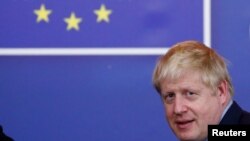British Prime Minister Boris Johnson is battling to persuade lawmakers to back the Brexit Withdrawal Agreement he signed with the European Union, ahead of a special session in the British Parliament scheduled Saturday. The vote on the deal is set to go to the wire and is likely to prove critical for Britain's future in or out of the EU.
Johnson's Conservative Party doesn't have a majority in the British Parliament, so the 10 votes of its allies, Northern Ireland's Democratic Unionist Party (DUP), could be decisive.
However, the DUP has indicated it will vote against the Withdrawal Agreement negotiated by Johnson, because party leaders say it undermines Northern Ireland's bond with the United Kingdom.
"Saturday is not the end. Saturday is not even the beginning of the end, because there is a whole range of issues that have to be sorted out in the withdrawal agreement," DUP leader Arlene Foster said Friday.
Without the DUP, the prime minister will have to persuade some opposition members of Parliament to break ranks but opposition leaders have all rejected the deal, warning that it will give Prime Minister Johnson carte blanche to tear up regulations and workers' rights. Only a few Labour Party MPs are expected to vote for the revised agreement.
If he loses, Boris Johnson must by law ask the EU for a Brexit extension, something he has repeatedly ruled out. Some EU leaders are also reluctant.
"I think we should stick to the October 31 deadline," French President Emmanuel Macron said Friday. "I don't indulge in political fiction so I'm not going to imagine a scenario where the British parliament votes this way or that way but I don't think that any new extension should be agreed to. I think we now need to finish these negotiations and move onto the negotiations about the future relationship and finish them too."
Even if the Withdrawal Agreement is passed, there are hurdles ahead, says Joelle Grogan, an EU law expert at Middlesex University.
"We need an Act of Parliament to make that law in the UK. We could see a lot of amendments to that act, maybe requiring something for example like another referendum."
That might not be wholly welcomed in Brussels.
"The levels of polarization (in Britain) have increased so much over the past three years that I think a narrow "remain" victory wouldn't solve those questions at all. And what it would mean for the EU would be that the UK would become an incredibly difficult member state, politically the governments would not be able to agree to any further EU integration," says Larissa Brunner, a political analyst at the European Policy Center in Brussels.
With Boris Johnson gone, the Brussels summit of EU leaders Friday moved on to other issues, including the war in Syria and the accession of North Macedonia into the EU.
In Europe, for some, there is Brexit fatigue, and a hope that both sides can move on after more than three years of uncertainty.




